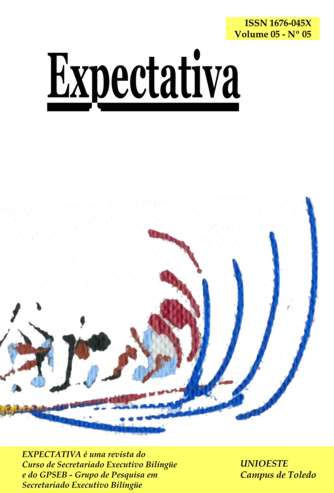THE GAP BETWEEN VOCABULARY KNOWLEDGE AND READING COMPREHENSION IN A FOREIGN LANGUAGE
DOI:
https://doi.org/10.48075/revex.v5i1.85Resumo
Assuming that children present a vocabulary knowledge about 5000 to 7000 words of their mother tongue before they have instructions at school, leads us to suppose what would be the circumstances in relation to the acquisition of a foreign language. Learner can face as major complexity as lesser be his/her vocabulary knowledge in the target language. The majority of the students took English classes in the elementary schools, as a result it can be suppose that the amount of vocabulary knowledge may not be enough to reach a satisfactory reading comprehension of most of the texts in a higher education level. It is taking into account all of a background and the proposed programs as well. Reading can be considered the most used and necessary skill in Brazil, consequently it is assumed that there is a major gap to be achieved on foreign language reading researches in view of the amount of researches done on the native language.Downloads
Publicado
11-06-2007
Como Citar
CALIXTO, B. J. THE GAP BETWEEN VOCABULARY KNOWLEDGE AND READING COMPREHENSION IN A FOREIGN LANGUAGE. Revista Expectativa, [S. l.], v. 5, n. 1, 2007. DOI: 10.48075/revex.v5i1.85. Disponível em: https://saber.unioeste.br/index.php/expectativa/article/view/85. Acesso em: 4 nov. 2025.
Edição
Seção
Seção - Línguas/Comunicação
Licença
Aviso de Direito Autoral Creative Commons
Política para Periódicos de Acesso Livre
Autores que publicam nesta revista concordam com os seguintes termos:
1. Autores mantém os direitos autorais e concedem à revista o direito de primeira publicação, com o trabalho simultaneamente licenciado sob a Licença Creative Commons Attribution que permite o compartilhamento do trabalho com reconhecimento da autoria e publicação inicial nesta revista.2. Autores têm autorização para assumir contratos adicionais separadamente, para distribuição não-exclusiva da versão do trabalho publicada nesta revista (ex.: publicar em repositório institucional ou como capítulo de livro), com reconhecimento de autoria e publicação inicial nesta revista.
3. Autores têm permissão e são estimulados a publicar e distribuir seu trabalho online (ex.: em repositórios institucionais ou na sua página pessoal) a qualquer ponto antes ou durante o processo editorial, já que isso pode gerar alterações produtivas, bem como aumentar o impacto e a citação do trabalho publicado (Veja O Efeito do Acesso Livre).
Licença Creative Commons
Esta obra está licenciada com uma Licença Creative Commons Atribuição-NãoComercial-CompartilhaIgual 4.0 Internacional, o que permite compartilhar, copiar, distribuir, exibir, reproduzir, a totalidade ou partes desde que não tenha objetivo comercial e sejam citados os autores e a fonte.


